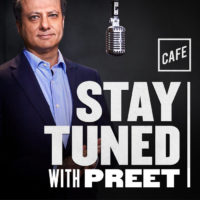
David Frum, well-known author and political pundit, former George W. Bush speechwriter, and Senior Editor of The Atlantic, was a guest of Preet Bharara on a recent episode of the podcast Stay Tuned with Preet (starting at 18:45). In it, Frum talks about his use of Twitter, saying “Twitter is a dangerous tool; it is an opportunity to end your career in a second.” Most of us have participated in a heated discussion on social media before, and we’ve certainly seen colleagues in the industry find themselves in trouble because of the way they used social media, so when Frum offers up his ground rules for using Twitter responsibly, I thought I’d share them here:
1. “No arguments about arguments.”
While Frum doesn’t shy away from disagreeing with people on Twitter, he’s careful to stay on topic. He warns against getting drawn into side arguments: “You’ll say something and somebody will say, ‘Well, you didn’t say a different thing about a different topic.'” Discussions can easily spiral our of control if you allow the conversation to chase tangents. Be conscious of this and stay focused.
2. “Always keep your cool.”
Frum doesn’t let friends drink and tweet. Also, he says, “Never do it in when you’re in a situation of emotional distress of any kind.” If you find yourself playing on tilt, it’s best to check yourself before you wreck yourself.
3. “Follow institutions…and then follow people who really know what they’re talking about.”
 There’s an ancient Silicon Valley proverb: “Garbage in, garbage out.” If you are following people on Twitter who routinely post uninformed or misinformed tweets, you are likely to do the same. Don’t confuse fame with expertise. Make sure that the people you are following are knowledgeable. Also, recognize that nobody is knowledgeable about every single topic, so pay attention to which topics the people you are following are knowledgeable about.
There’s an ancient Silicon Valley proverb: “Garbage in, garbage out.” If you are following people on Twitter who routinely post uninformed or misinformed tweets, you are likely to do the same. Don’t confuse fame with expertise. Make sure that the people you are following are knowledgeable. Also, recognize that nobody is knowledgeable about every single topic, so pay attention to which topics the people you are following are knowledgeable about.
4. “Never try and get the last word.”
Frum says the he thinks of his conversations on Twitter like his conversations as a guest on television shows: You’re talking to the people who watch. “You’re not talking to the host, you’re not really talking to the other guests; you’re talking to the people on the other side of the camera.” The same is true with the Twitter: Because the conversation is public, be aware of the people who are reading the conversation but not participating in it. You may have a strong urge to land one last witty blow against somebody you disagree with, but onlookers may not view this in a flattering light.
5. “Just as our parents didn’t understand that TV wasn’t real, we often have a hard time understanding that social media isn’t real.”
When television first emerged, audiences didn’t yet understand how it could be manipulated. Video footage influences how people interpret an event. A classic example is the televised presidential debate between John F. Kennedy and Richard M. Nixon in 1960. While the consensus of those who watched the debate on television was that Kennedy won, most people who listened to it on the radio thought that it was a draw or that Nixon came out on top. We understand today that there’s much more to television than just the finished product we see on the screen. For example, we know that reality TV shows are often scripted and heavily edited to manipulate the emotions of viewers.
While we are often on guard against this type of manipulation on television because we grew up with the medium, we may be more vulnerable to it on social medium because we haven’t been using it as long. “We’re victims of made-for-social-media moments that are very manipulative,” says Frum, pointing to the recent example of a confrontation between a high school student and a Native American protester at a march in Washington, D.C. In the days following the incident, more and more information emerged that the initial video didn’t capture, adding additional context. In recent years, we’ve seen more and more examples of this. What social media posts can capture is, at best, incomplete, and at worst, intentionally manipulated.
Social media can be a powerful tool, but with great power comes great responsibility. Even Frum admits that he doesn’t always adhere to these rules. Bharara asked, “Have you ever tweeted in anger?”
Frum replied, “I have a few times, and I’ve always regretted it.”
Hopefully, Frum’s rules can help you use Twitter wisely.
More Digital Tips
- Set Yourself Up to Measure Your Own Social Media Questions
- Rethinking Radio’s Concert Calendar Webpage for the Delta Variant
- In Podcasting, Is It Easier to Achieve Scale Through Content or Technology?
- Tips for Creating Email Signup Forms
- How Radio Stations Can Use Gary Vaynerchuck’s $1.80 Instagram Strategy
- A Simple Digital Treat to Thank Your Radio Listeners This Thanksgiving - November 13, 2023
- Interview Questions When Hiring Your Radio Station’s Next Digital Marketing Manager - November 6, 2023
- A Radio Conversation with ChatGPT: Part 2 – Promotions - October 30, 2023





Leave a Reply